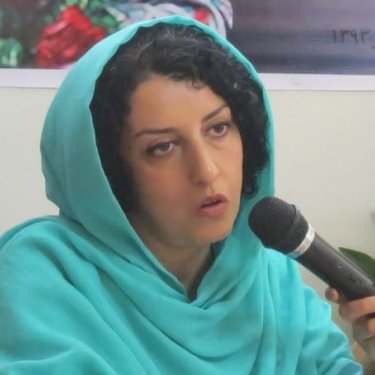Call for release of Narges Mohammadi, jailed Iranian journalist committed to exposing violence against fellow female detainees

Following the publication of a new letter by imprisoned Iranian journalist Narges Mohammadi about violence against women detained in Iran, Reporters Without Borders (RSF) calls on the Iranian authorities to put a stop to this violence and to release Mohammadi and all other journalists held in Iran.
The 2022 RSF Laureate for Courage, Narges Mohammadi published her second letter about the mistreatment of women during arrest and in different prisons on 18 August, two weeks after being punished for her earlier letter about violence against female detainees.
She writes in her latest letter: “As a witness to the acts of horrifying and deadly physical violence by the regime against protesting women, I declare that these levels of physical violence during arrest and within unlawful detention facilities represent a form of systematic torture aimed at creating intimidation and terror."
Mohammadi also says that the victims refrain from publicising the psychological and physical violence they suffer during detention for fear of being threatened or being charged and tried on additional charges. “Their families also avoid sharing their stories,” she writes.
The proceedings to which Mohammadi is being subjected illustrate the methods of intimidation and violence employed by the Iranian government by means of its judicial and prison systems. As a result of her previous letter, published on 3 December on her Instagram account, which is managed by her family, her prison sentence was increased by a year a few months later by Revolutionary Court No. 29 under Judge Ali Muzloom.
For denouncing sexual violence by officials against females detainees, she is now sentenced to 10 years and 9 months in prison and 145 lashes. But Mohammadi – the author of “White Torture,” a book based on interviews with 16 imprisoned women who were the victims of violence while in prison – faces the possibility of more increases in her sentences and further convictions in the five trials initiated by the Evin prison security prosecutor's office since her most recent arrest on 16 November 2021.
“The more Narges Mohammadi speaks out and exercises her right to inform, even from prison, the more her jailers subject her to repeated additional arbitrary punishments. But this journalist has shown that she will not succumb to pressure. Thanks to her courage, the world knows what is going on inside the prisons in the Islamic Republic of Iran, where six other women journalists are now detained. We demand their release, as well as Narges Mohammadi’s.
According to Mohammadi's husband, Taghi Rahmani, the flogging sentence has not yet been carried out because of all the international support she has been getting. But he is very worried about the conditions in which she is being held. “Narges is paying the price for her convictions, for her decision to speak out,” he told RSF.
In addition to the series of convictions in the past 15 months, she can no longer receive international phone calls. This means she is denied any direct communication with her husband and two children, who live in France.
On 7 June, RSF referred the unacceptable conditions in which Mohammadi is being detained to all of the relevant UN human rights bodies. During an oral update to the UN Human Rights Council on 5 July, the Independent International Fact-Finding Mission on the Islamic Republic of Iran expressed concern over the “continued detention of human rights defenders and lawyers defending the protesters, and at least 17 journalists.”
Violence against detained women journalists
The accounts provided by Mohammadi have completed the terrifying picture of state violence against women journalists that takes place both inside and outside prisons in the Islamic Republic.
The latest example came on 15 August. Just two days after her release from prison, Roudayd24 reporter Nazila Maroufian was “hit violently on the backside” by a policeman when she went to Tehran police station No. 106 to recover the phone that was confiscated from her at the time of arrest.
The assault was witnessed by Maroufian’s mother, who immediately reminded the police officers present of Mahsa Amini, the young Kurdish student whose death in police custody on 16 September 2022 triggered a huge wave of street protests, to which the authorities responded with a crackdown on journalists that still continues.
It was for interviewing Amini’s father that Maroufian was first arrested on 30 October 2022. After being released on bail on 9 January, she was sentenced at the end of January to two years in prison on a charge of “disseminating propaganda against the system,” but was then included in one of a series of amnesties.
After being arrested again on 7 July 2023 on charges of “collusion” and “anti-government propaganda,” Maroufian was herself the victim of prison violence. Suffering from heart palpitations and respiratory problems, she was transferred to Taleghani Hospital and was released provisionally a few days later, on 13 August. She was arrested yet again the next day, 14 August, for posting a photo of herself without a headscarf as soon as she had been released, and was again held arbitrarily for 24 hours.
The 25 journalists currently detained in Iran include six other women. They are Elahe Mohammadi of Han Mihan and Niloofar Hamedi of Shargh, who are currently awaiting verdicts in their trials; Melika Hashemi of the Shahr News Agency; and freelancers Farzane Yahyaabadi, Maliheh Daraki and Saeede Shafiei.
